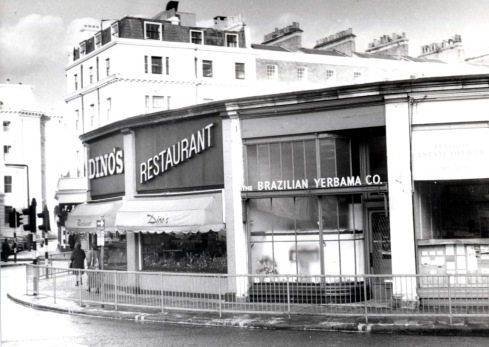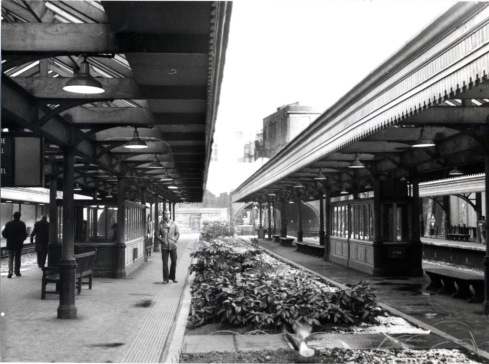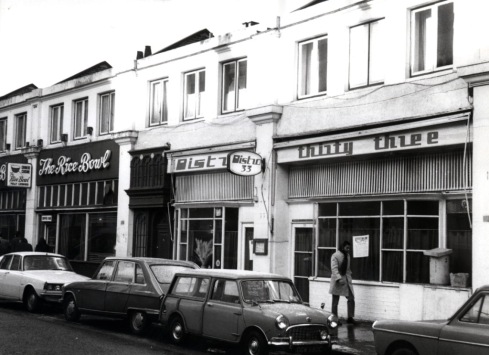Anyone who lives in the South Kensington area will probably recognise this view even though the picture was taken about 1970.
The building is Malvern Court. On the right side is Onslow Gardens, where most of the buses get down to the Fulham Road. On the left is Pelham Street. Both of these streets face South Kensington Station, from which the picture was taken.
South Kensington Station, like its near neighbour Gloucester Road (see this post) is actually two stations. One is the original Metropolitan and District Railway station opened in 1868.
The other is the Piccadilly Line station.
The deep line was opened in 1906 . In those days it looked like this:
(The Great Northern, Piccadilly and Brompton Railway) The two stations existed side by side although eventually access was purely through the District and Metropolitan entrance.
Note the older wrought iron lettering below the “modern” sign. And see how close the road is to the station entrance. The pedestrianised zone around the front of the station has enlarged considerably in recent years creating the modern plaza which makes things easier for walkers and the traffic management simpler.
I cannot resist a peek inside the arcade.
Vinces (groceries?) , (Hudson Brothers in grander times) are closing down and some winter fashions are being worn. (It’s January) The iron lettering is visible, as is the 3 minute heel bar.
But this post is not actually about the station so much as the shops and services clustered around it. In 1970 this included Dino’s Restaurant, and the intriguing Brazilian Yerbama Company, importers of medicinal herbs.
The anonymous looking shopfront next to them with the handwritten notices in the window is an estate agent, the imaginatively named Pelham Estate Offices. And beside them, where you can now queue up for Ben’s Cookies, is Kontad Limited who sold Typewriters, Calculators and office equipment. Many of them are on view in the window with a sign for Grundig who made many electonic devices in those days. I used to own typewriters….(drifts away, reminiscing….)
Those of you brought up in the digital age cannot imagine the relief I felt when I started to use a computer regularly for that new-fangled word processing. Readers of my own age group can spare a moment for nostalgia about worn out ribbons, jammed keys, carbon paper and correcting fluid
On the other side of the station building was a business with a puzzling sign.
LW Fleet Limited, upholsterers. “Curtain makers, Upholsters, Decorating consultants” I think. Perhaps they were shutting down and didn’t mind the falling letters.
But hold on a minute. If you take a moment now and check out the eastern side of Pelham Street on Google Maps Street View all you will find next to the station is a wall, behind which are the rail tracks. It’s difficult to imagine a row of buildings in that spot, seemingly perched on the edge of a railway line but here it is – Station Buildings as you can see in the roof line sign below.
Although it looks unlikely, clearly there was room at the top of the slope to the tracks to fit in a row of two storey buildings with retail outlets such as Primitives (“dealers in works of art”). I was at the station this morning to have a look in the flesh (or should that be in the bricks?) and if you factor in the width of the Piccadilly line station there was room, although you must have had to be careful at the rear exits of the buildings. Let’s just look at the view from the platform.
There is no view of the back of the station buildings. I had some hopes for the building on the right above the platform roof with a fire escape but I eventually found:
A 1:2500 scale OS sheet which showed them. The building with the fire escape is an electricity sub station on the other side of the bridge (which is still there today).
Next to Primitives was Flair (“gowns”, according to Kelly’s Post Office Directory).
Those two young women striding by look as though the goods in the Flair window are not going to delay them. (The puzzle is that clock, but more on that in a moment.) I’ve been looking at the windows above the shops. Something about those open windows and the visible light says office space to me, rather than residential (there are no entries in the eelctoral register for this section of the street)
At last, a famous name, Laura Ashley, with some of her distinctive dresses in the window. “Sale now on”.
In the picture below at numbers 27-29, the Rice Bowl, a Chinese restaurant and coffee bar. I don’t know why the clock with their name on it is still attached to Flair at number 21.
Beside the Rice Bowl at 31/33 another place to eat, Bistro 33. The owner didn’t spend too much time naming his or her establishment.
Nice 70s lettering though, and a 70s dude walking by to give us some local colour. In close up you can see through the windows of the Mini that shepherd’s pie and Spanish omelette were on offer. Fairly standard bistro fare for the period I suppose.
I have no pictures of the remaining establishments, Stefan’s Delicatessen, Elsa (milliner) or Roger W Pliszka Antiques Limited, which is a shame. After them Kelly’s tells us: here is Pelham Place.
Beneath the road (which is actually part of Thurloe Square) where those Morrises or Austins are parked and behind that ragged and overgrown wall is the railway, now going underground.
You can still see this distinctive building on the west side of Pelham Street, the brick chimney contrasting with the plastered front. The wall is still there, benefiting from a little tidying up.
The woman in the leather coat on the other hand has moved on now and might be harder to find these days.
Postscript
I was off work last week and arrived back not quite sure what to do for this week’s post. Would it be Shakespeare related? What about those water colours by a 19th century lady? Or possibly Backwaters 2? I’d almost settled on that but found myself getting fascinated by these vanished shops which had been drawn to my attention by Michael Bach. So thanks to him.
On the subject of last week’s backwaters I should add that the pictures were of Royal Crescent garden square, W11, Railway Mews W11 (off Ladbroke Grove), Lexham and Radley Mews, W8, Lenthall Place, SW7 and Cavaye Place SW10. All north of the Fulham Road and therefore all in Kensington according to the traditional boundary. There will be more of them soon.

















